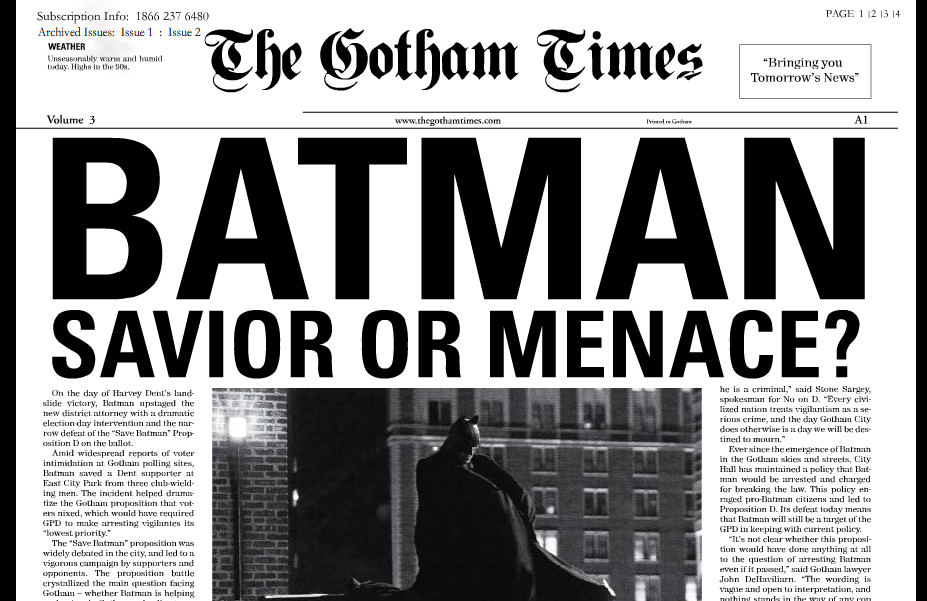A lot of descriptions have been given to Gotham’s bat-shaped protector over the years: the Caped Crusader, the Dark Knight, or Batsy if you were to ask a certain Joker. At the end of The Dark Knight, James Gordon even says that Batman is “the hero Gotham City deserves.”
But is that really the case? Writers have been playing on the inherent connection between Batman and his home town Gotham for years. But is Gotham just a place where crazy things happen, or does Batman contribute to that insanity? Is Batman, in fact, good for Gotham?
The History of Gotham
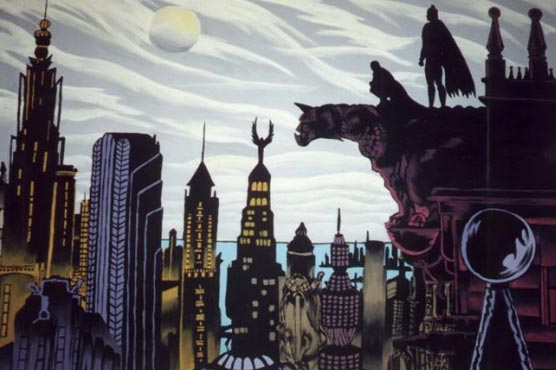
Gotham City is a writer’s paradise in terms of setting. Its dark, urban, with plenty of back alleys, sweeping stylized skyscrapers, and interesting little locations to set every kind of super-tale. It also has a notorious history within the DC Universe for being a dangerous town full of degenerates and criminals. It’s a city full of good people trying to exist in a cesspool of decay, caught in a downward spiral and corruption that has had a crippling hold on the place for generations. The night Thomas and Martha Wayne took their son out to the movies (or the opera) is often presented as a typical event in the horror that is Gotham City.
Then came the Batman.
The Dark Knight: Using Terror As An Agent
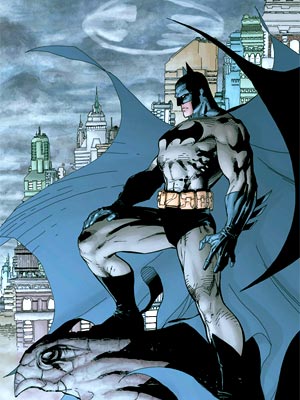 When Bruce Wayne took up the mantle of Batman to combat crime in the comics, he was a game changer. He mixed his nearly unlimited budget with his devotion to physical perfection, using a keen detective’s mind to push forward his unwavering dedication to vengeance. Batman became an image, carefully crafted by Wayne to terrify criminals so they’d be more easily managed.
When Bruce Wayne took up the mantle of Batman to combat crime in the comics, he was a game changer. He mixed his nearly unlimited budget with his devotion to physical perfection, using a keen detective’s mind to push forward his unwavering dedication to vengeance. Batman became an image, carefully crafted by Wayne to terrify criminals so they’d be more easily managed.
Let me be clear about the implications of that for a moment. Batman crafted his image by utilizing terror and fear as a weapon against the criminal element outside of the confines of the law. Batman’s arrival changed the rules under which the city’s criminals and law enforcement historically operated. Where before criminals would maneuver freely around the law and the long-suffering cops who put on the GCPD badge, now doing so would run them straight into Batman. His arrival signaled that it was no longer necessary to operate within the boundaries of the law to police crimes. The only way to stop Batman was to kill him. Something that Batman took great flair in proving impossible, as it only reinforced the terror he inspired in those that he pursued.
This had the effect of making criminals hyper vigilant, paranoid, and even more violent to counter Batman’s overwhelming capabilities. If they wanted to remain in business, they would have to choose more aggressive or insidious tactics to survive a man who did not care about police procedure and investigation. Like bacteria responding to a new antibiotic, the criminals of Gotham got tougher, smarter, and more crafty.
Some of them became literal as well as figurative monsters.
Send In The Clown: Batman’s Villains
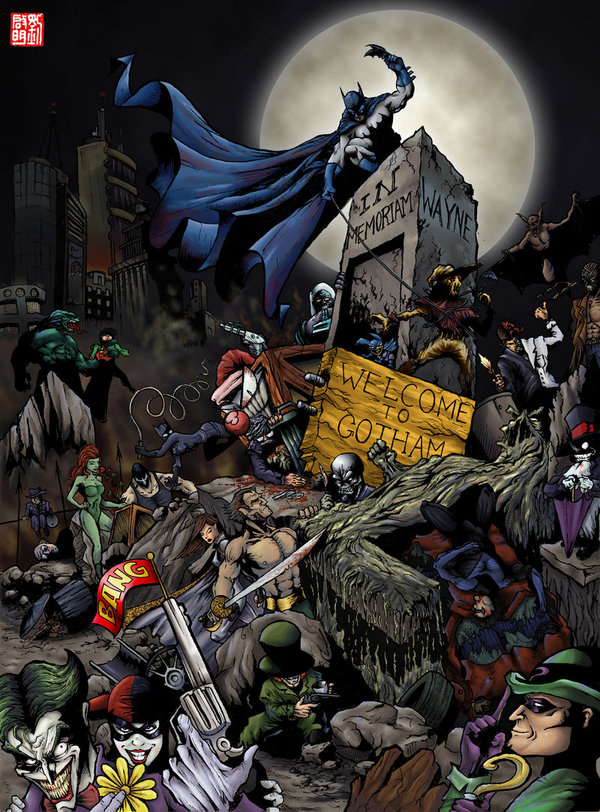 If Batman relied on terror, so too did the super-criminals of Gotham. Out of the shadows popped costumed bad guys the likes of which the city had never seen. They were responding to a man who had already set the standard by stepping out of the boundaries of “normal” so they did the exact same thing. Gone were the days of gangs; in the comics Batman busts their almost laughably pedestrian enterprise on a regular basis. Here came creatures like the Joker.
If Batman relied on terror, so too did the super-criminals of Gotham. Out of the shadows popped costumed bad guys the likes of which the city had never seen. They were responding to a man who had already set the standard by stepping out of the boundaries of “normal” so they did the exact same thing. Gone were the days of gangs; in the comics Batman busts their almost laughably pedestrian enterprise on a regular basis. Here came creatures like the Joker.
The Nolan movies heavily demonstrate Batman’s impact on the criminal element. If the Joker can be said to have any guiding principle, it is to cause carnage in Gotham just to watch Batman react to it.
As Gordon says at the end of Batman Begins, Batman presents a new issue: Escalation. Batman offers them a focal point for their rage at being foiled. Into Arkham Asylum they go to stew in their own fury, only to break out again and try to “kill the Bat” with the city of Gotham stuck in the middle.
And the body count, despite Batman’s best attempts, always goes up.
Dark Knight, White Knight Tactics: The Revolving Door of Gotham Crime
Why do people in Gotham keep dying by the droves at the hands of these costumed madmen, then, if there is a super hero in the city that works almost exclusively to put them away? The problem comes down to deterrent, and that is the crux of this argument.
Batman is not a good enough deterrent to super-criminals. Sure, some of the smaller criminals—the muggers, the pickpockets—might give up their ways or go to jail because of Batman’s actions. But their actions pale against criminals that respond to the escalation Batman embodies.
Say the Joker kills some folks to get Batman’s attention. What next? Well, Batman saves the day all right and Joker gets incarcerated. But does the Joker, the mass murderer and terrorist, end up in some deep, dark hole somewhere? Is he given the death penalty? Or is he placed into a system of justice that the very notion of Batman exists to circumvent? Here is a criminal that has matched Batman’s ability to overpower the capabilities of the police, the legal system, etc., and yet Batman expects that same system to be able to handle said criminal.
This renders the Batman as an almost impotent hero. His villains reoccur so often and so quickly that it proves he is not a capable deterrent for major criminals. He has in fact exacerbated the problem of crime in Gotham by drawing out these psychopaths in the first place and then giving them a target, a new vendetta, and a license to get creative in their mission to “kill the Bat’.” And since he lives by a code that makes him unwilling to kill an enemy, the cycle of destruction continues.
Batman: The Hero Gotham Has
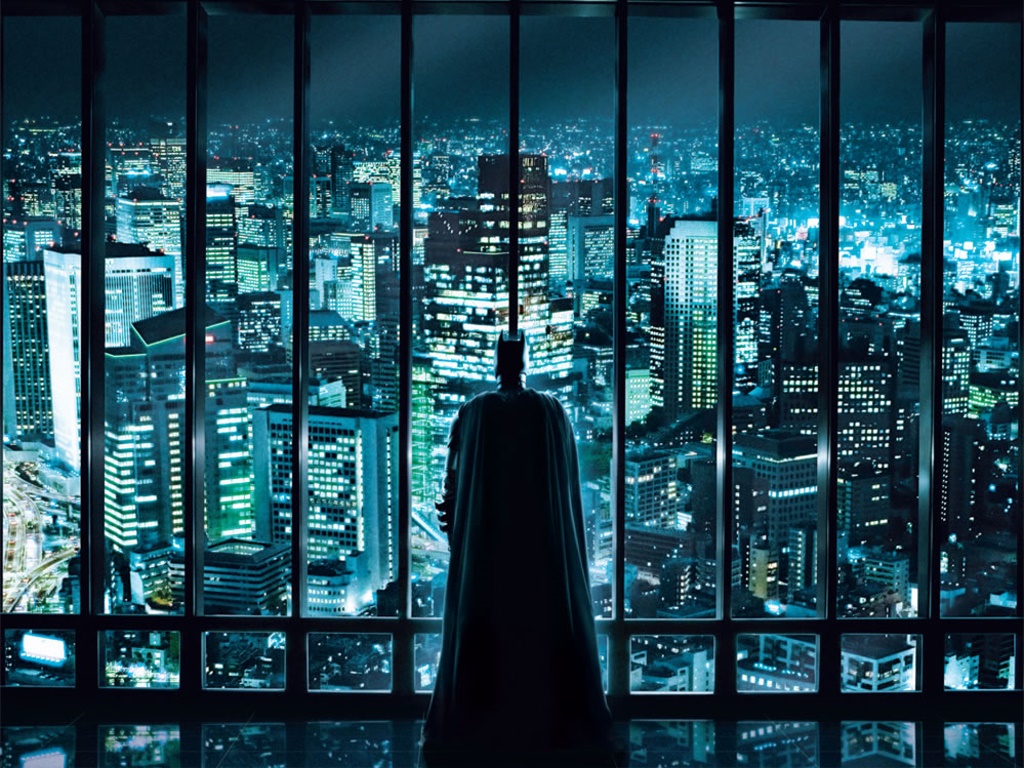
So in the end is Commissioner Gordon right? Does Gotham deserve Batman? A corrupt city out to destroy itself from the inside gets a hero that is a product of that exact system’s malfunction. That hero then evolves the criminal arms race to a battle of crime fighter versus crime titan. Is that what Gotham really deserves?
The question about the almost symbiotic relationship between Batman and Gotham has made for some of the most compelling reading in all of DC Comics. While I could see the shining Metropolis without Superman, I could not see Gotham without the Batman. Vice versa, if Batman had grown up in Coast City or Smallville he’d be a much different creature. Batman is a creature of Gotham as much as he is a super hero, a product of its streets as much as Scarecrow or Riddler or Catwoman. He has been the catalyst for Gotham’s change, for violent upheaval and macabre events since his arrival on the superhero scene. And though he no longer serves as a deterrent, he is as much a part of the cycle of Gotham as its municipal structures. Gotham has running water, Gotham has the Joker killing randomly, Gotham has Batman stopping the carnage. So is the cycle of Batman’s stories.
Would it all end if Batman went away? No. As the comics have shown, the genie is definitely out of the bottle there. Once Batman is away for a little while (such as the times during “No Man’s Land” and the “Knightfall” storylines), the city falls in to even more chaos. Because now, despite whatever was before, Gotham and it’s Dark Knight are inexplicably linked. Batman is the balance against the madness he had a hand in creating. There almost literally cannot really be a Gotham without a Batman.
In the end, perhaps the real statement should be that Gotham is the city Batman deserves. After all, he helped make it what it has become.
Shoshana Kessock is a comics fan, photographer, game developer, LARPer and all around geek girl. She’s the creator of Phoenix Outlaw Productions and ReImaginedReality.com










